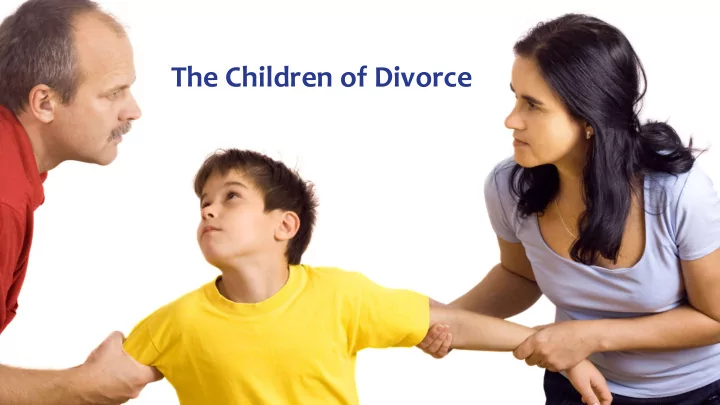

The Children of Divorce
IT’S BETTER TO BE FROM A BROKEN HOME... THAN LIVING IN ONE
Risks 50% higher health problems • Lower grades, 2x likely to drop out of high school, • leads to lower level of education, lower paying jobs 300% more likely to need treatment • 2x likely to contemplate/attempt suicide • High vulnerability to drug and alcohol use • Higher levels of fear of commitment and divorce •
Effects/Supports Toddlers/Pre-schoolers: ( Trust/Control, Object Impermanence) Confusion, fear, loss of control Self blame Problems with daily routines/transitions Separation anxiety Tantrums, aggression, clinginess Physical complaints- headaches, tummy aches Reponses: Reassure Love Monitor Changes Provide Consistency Reassure Not Leaving Them Identify Feelings Provide Simple, Clear Explanations
School Aged: ( Competence) Sad, angry • Guilt and self blame • Takes sides, loyalty conflicts • Physical complaints • Fear of losing absent parent • Responses: Reassure not to blame • Identify Changes • Facilitate Expression •
Pre Teens/ Teens: ( Identity) Angry and hostile to 1 or both parents • Changes in behaviors, attitudes, perceptions • Physical Complaints • Problems with Peers (withdraw, distrust) • Acting out • Parentification/Role Reversal • Worries about money, schedule, school • Responses: Identify emotions, concerns, complaints • Provide clear limits • Facilitate input into schedule, adjust to THEIR • schedule Resist Role Reversal • Resist messenger/ middle •
Can’t Go Wrong.... Constants What is NOT changing? Choices What choices DO they have? Communication listen, empathize, neutral talk, assure, mirror feelings Clinical Support know when it’s time to bring in help
Guiding Principles Do not make the children the messengers • Take the high road, set boundaries with your ex and • do not take the bait for conflicts Work on YOUR grief • No bad mouthing • No third degree, speak without grilling • Take responsibility for errors, commit to changes • Have a pre-determined schedule with flexibility • Practice first right of refusal • Agree on parenting principles • Remember that your child’s affection for the other • parent is NOT a threat ( your power rests in the energy you put into YOUR relationship with your child) Demonstrate a positive relationship with your ex • Appreciate the contributions of the other parent • Divorce is a process not an event, requires • continual, repeated supports and attention
Implications The higher the conflicts, the fewer transitions • The younger the children, the higher transitions • Individual therapy to ground your grief • Family Meetings, co-parenting therapy • Family Wizard App for calendars, messaging, • expense log, information banking Consider nesting • Therapy for the children – individual, group • Blended families – slow integration not within 1 • year of separation, step-parent role is friend not parent
Recommend
More recommend